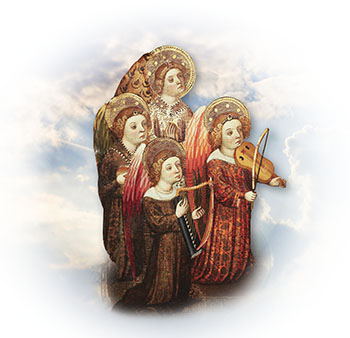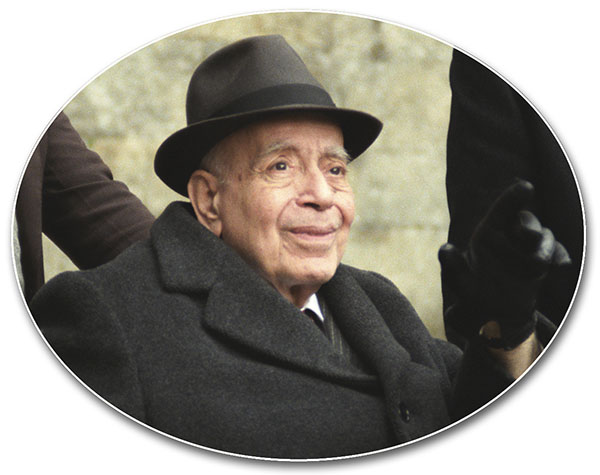I have always had a particular impression of certain descriptions or representations of Heaven. By faith, I knew it was a place where all delights were to be found, but when they were described to me, I had the feeling that they were delights for others and not for me.
For example, some pictures depicted a very blue Heaven, with a white cloud in the shape of a sofa on which sat an Angel playing the violin. Of course, there is no material cloud in Heaven, but this way of painting it symbolizes the heavenly reality. However, that is not the entire picture: you would have to add other elements to get a complete idea of it.

I realize that those paintings presented something more pleasant than this vale of tears. Even so, if I had to spend eternity in a blue sky, sitting on a white cloud and playing the violin, I confess that my soul would not feel it was in its homeland.
A mistaken impression of immobility
I also felt dissatisfied with the misguided idea of sketching Heaven immersed in a kind of immobility. According to Catholic doctrine, man cannot grow in his degree of essential glory in Paradise. He remains there for eternity in accordance with the reward he received after death, enjoying full happiness.
As a result, I had the impression that in Heaven everything had stopped forever, and that all the elect beheld an equally immobile God. Since movement and communication are part of our way of being, I found it difficult to understand the attraction of such a Heaven.
These were some mistaken impressions which, if not corrected, could have diminished my hope and interest in the goods of heaven.
Movement in Heaven, by the increase of accidental happiness
I then began to work at analysing Heaven based on the commentaries of the saints, in order to form a true image of it and to make it more appealing.
Let us consider more specifically what could be called heavenly immobility. Is it accurate to say that, in eternal beatitude, a soul’s happiness is not subject to increase, and that for this reason everything there is as still as one is lead to imagine? Or does the intensity of this joy increase?
In other words, is there movement and life in Heaven – even very vigorous movement – that we have no idea about? What is it like?
In order to progressively build up a real picture of Heaven, let us consider that when a man performs a certain good or bad act, even after he has been judged and received his reward or punishment, that act sometimes continues to have repercussions until the end of the world.
Take, for example, a religious who attracts a person to enter his congregation. It seems so simple and trivial. But the person who was attracted can bring in another, who in turn will call in a third and so on, so that until the end of time there will be a vein of spiritual children, grandchildren, great-grandchildren and great-great-grandchildren of that religious who brought in the first.
As the centuries go by, from the heights of Heaven he can see the effect of his good deed and will experience renewed joys as a result. Even though he is already flooded with happiness to contemplate God face to face, when he looks down to earth and recognizes the consequences of the good he has done, his joy, so to speak, increases.
A soul’s happiness can therefore grow accidentally by reason of the multiplication, over time, of the effects of the good actions performed. This truth, by the way, always encourages me when I set out to write a book: the work may bear good fruit until the end of the world, and in Heaven my joy will increase at seeing that, say, a thousand years from now this book has done good for some soul and given glory to God.
Exchange between eternity and time
Let us consider yet another example. Let us imagine a queen married to a very powerful king, enjoying with him all the happiness that her status imparts to her.
Suppose that on her birthday, a group of peasants comes to dance in front of the window of her room, out of love for her and to pay her homage. If the peasants had not come, the queen would still be happy because of her relationship with the king, which is her essential happiness. But once those subjects turn up to honour her, the sovereign experiences an additional accidental joy. She goes out onto the terrace, watches the scene, is pleased with the peasants and then has sweets served to them and says a kind word to each one. They are overjoyed and she is delighted.
So this episode accidentally, and not essentially, increased the queen’s contentment, like the fringes of the carpet which, without being part of it, nevertheless serve as an extension.
Similarly, many events on earth can increase our joy in Heaven, because there is a relationship between the two, whereby the happiness of Paradise changes according to situations in this world.
In passing, it is worth remembering that this rule also applies to hell: whenever the condemned contemplates the evil he has done affecting others in time, his torment can, in a certain accidental sense, increase.
This leads us to reflect, because everything we do in this earthly life has repercussions of glory in Heaven or of sorrow in hell. If we knew how to contemplate every act of our existence in this way, how different our lives would be!
If were also to conceive of Heaven as an earthly grandstand, with the Saints being able to actively intervene among those here below through their prayers and inspirations, how differently we would feel about Paradise!
St. Therese of the Child Jesus used to say that she wanted to spend her Heaven doing good upon earth. That is a beautiful plan, which once again proves to us the reality of this exchange between eternal beatitude and time.
Coexistence that intensifies the relationship with God
Someone might ask: “Dr. Plinio, I agree, but when human history on earth ends and all the elect are in Heaven, will everything then come to a standstill?”

To answer this question, I will evoke a beautiful passage from the life of St. Gertrude.
It is said that one day, when she and her nuns were singing the Ave Maria during the office of Matins, the Saint was rapt in ecstasy. She saw three streams of light – symbolizing the power of the Father, the wisdom of the Son and the merciful tenderness of the Holy Spirit – pouring from the bosom of the Blessed Trinity and penetrating Our Lady’s Heart, thence returning to their source, the Blessed Trinity.
This vision showed how the Mother of God rejoices in her Heart, and how in her Heart there are new expansions of the Most Holy Trinity every time a soul on earth devoutly recites the Hail Mary.
Now, a fortiori, when one of the saints in Heaven praises Our Lady, there is an increase in her communication with the Blessed Trinity and vice versa. Just as there is an accidental increase of joy in Paradise whereby, as the saints love one another and communicate among themselves, the relationship of each of them with God is simultaneously intensified.
There is therefore a kind of reciprocal interaction with which God associates himself. It is the movement of Heaven, like an immense, most holy and most innocent polity, in which everyone endeavours, without tiring, to increase their own joy and that of others, swimming, as it were, in mutual kindness and happiness.
A continuous novelty
From this point of view, Heaven could be compared to a perfect, splendid court, where the courtiers, when they meet, bow deeply before each other with immense love; then they greet each other before the King who, on perceiving this affection, rejoices and bestows on each one a reward. They thank the Monarch for his munificence and he offers them more honours. And so they go from reward to reward, always enriched with something new.
This life and this movement in Heaven are seen above all in the progress that the elect make in their knowledge of God, who is infinitely interesting. In his gentleness and affability, He reveals all things to us in their essence, with charm, with enchantment, with what could be called a divine verve such as we cannot fathom…
So that, throughout all His infinitudes, we will always see God differently and we will never finish getting to know Him. He will be a continuous novelty for us, the different aspects of which the Angels and Saints will comment on amongst themselves, because each one contemplates and adores God from different angles.
The conversation on the divine excellences will be sung, and this eternal song of Heaven will induce the just to constant progress, without fatigue, because it is movement and rest at the same time.
How would I imagine my Heaven?
Finally, in response to the kind request of my listeners, I will tell you how I imagine Heaven for myself, if God’s mercy leads me there. Realizing that, at Mary’s request, Our Lord can give me something very different from what I imagine, what I am about to say is just a draft, made with a certain restraint, imploring Our Lady to give me something even better.
Taking into account the make-up of my soul, I imagine that I would see God the Father, God the Son, God the Holy Spirit and, just below, Our Lady. I would contemplate them at a prodigious height, infinitely higher than myself, in such a way that I would feel like a speck of dust compared to them, but delighted to be a speck of dust and for them to be what they are.
At the same time, by a paradox, I would be so close to them that I would see them and consider myself in a position to love everything exactly as they do. Between God, Our Lady and me, I would like to contemplate a splendid and harmonious hierarchy of people, successively superior, with increasing perfections and rankings, through which I could get to know God better.
And I imagine myself enchanted by this hierarchy, small within it, but enraptured by it, having the impression that all these splendours would inundate me and be reflected in me as something very grave, very serious, very majestic, on the one hand; on the other, very affable, full of smiles and condescension towards me, so that I would exclaim: “I have arrived at the homeland of my soul at last!”

Such a conception of Heaven would not be complete without the idea of a special relationship with Our Lady. A relationship that, if it were not being too audacious, I would aspire to be very special, like that of a speck of dust next to the throne of the Heavenly Queen, very close to Her and – why not dare to imagine it? – even in the very Heart of the Blessed Virgin.
That is my wish. That is what Heaven would be like for me. ◊
Taken, with adaptations, from:
Dr. Plinio. São Paulo. Year VII. N.76
(July, 2004); p.26-30


